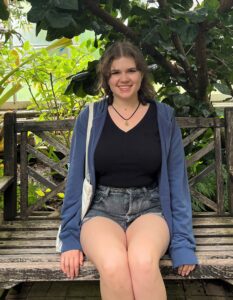Allegheny College Student Contributes First Online Exhibit To The Museum of Food and Culture Focused On Foraging, Invasive Weeds
Next time you’re pulling your invasive weeds, think twice before chucking them. Think about it as foraging for food. Katherine Hoehl ’25 has discovered palatable uses for what we might disregard in the yard.

As a student studying environmental science and sustainability (ESS) with a biology minor at Allegheny College, Hoehl became interested in creating a cookbook for foragers (or would-be foragers) and invasive weeds when contemplating her Senior Comprehensive Project. The idea was inspired by Alexis Nikole, a forager, and Robin Wall Kimmerer, a botanist and author.
The guide, designed with a practical approach for cooks of all experience levels, delves into five invasive weeds, including:
- Dandelions
- Broadleaf plantain
- Garlic mustang
- Ground ivy
- Japanese knotweed
“Not only will readers learn tasty recipes for each species, but also dive into the ecological impacts, whether good or bad, their historical significance, and cultural uses,” reflects Hoehl.
Her advisor Professor of ESS, Eric Pallant, saw the potential in Hoehl’s project and encouraged her to integrate the cookbook with the Museum of Food and Culture, which has become its first online exhibit. She also credits her peers, Elizabeth Dyer ’25 and Madison Kermis ’25, for helping her harvest the weeds on campus and taste-testing recipes.
Fascinated with forging, Hoehl states that the natural food gathering practice was once commonplace, but is now becoming a lost tradition.
“My biggest takeaway from working on the project has been how much knowledge and tradition has been nearly erased from North America due to a long history of colonization, genocide, and industrialization,” says Hoehl. “Invasive and introduced species tell us the story of the land and its history, reflecting the cultural and biological destruction caused by colonization.”
Hoehl notes that foraging laws have been put into place to restrict Indigenous communities who have used foraging for thousands of years, as well as a method for gathering food for African Americans after emancipation.
“Today there is hardly the drive to pass on the teachings, let alone an abundance of individuals who still carry the knowledge. This project is only the tip of the iceberg. There’s still so much to re-learn and heal,” says Hoehl.
After graduating from Allegheny College, Hoehl hopes to attend graduate school to study botany or ecology.
Explore research and opportunities with the Department of ESS here.